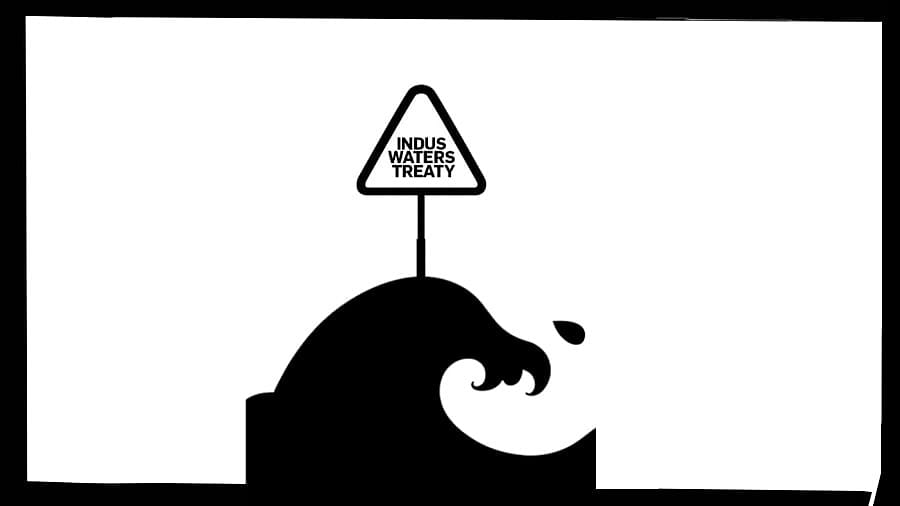
India’s recent efforts to seek a modification to the Indus Waters Treaty (IWT) reaffirm a shift in its stance on the decades-old agreement. On August 30, 2024, India sent a formal notice to Pakistan, seeking to renegotiate the treaty, citing changing circumstances that necessitate a review. This follows an earlier notice in January 2023, in which India expressed concerns about Pakistan’s lack of cooperation in the treaty’s implementation.
The reason for the current notification appears to differ from the earlier one. While India’s January 2023 notification primarily cited Pakistan’s alleged intransigence as the main concern, the recent notification emphasises the evolving realities within the Indus basin as the primary rationale. According to a government note summarising the August notification, “India’s notification highlights fundamental and unforeseen changes in circumstances that require a reassessment of obligations under various Articles of the Treaty.
Key concerns include shifts in population demographics, environmental challenges such as the need to expedite clean energy development to meet India’s emission targets, and the ongoing impact of cross-border terrorism.” This represents a significant shift in India’s stance, moving from earlier accusations of Pakistan’s non-compliance with the IWT to recognising and addressing the emerging challenges in the region’s geography.
India’s decision to serve notice to Pakistan regarding the IWT reflects a timely response to emerging challenges and shifting realities within the Indus River Basin. One of the key factors driving this decision is the significant change in the population demographics of the basin. The Indus River Basin supports the world’s largest system of irrigated agriculture, serving over 300 million people across India and Pakistan.
On the Indian side, approximately 59 million people rely on the basin’s water resources, and this number continues to rise, placing increased pressure on already limited water supplies. For example, Jammu and Kashmir, which lies at the heart of the Indus Waters Treaty, has seen its population grow from 3.56 million in 1961 to 12.5 million in 2011—a more than threefold increase since the treaty’s inception. This demographic shift has intensified the demand for water in the region, particularly for agriculture, domestic use, and industrial purposes.
In terms of hydropower generation, India has yet to fully harness the potential of the Indus Basin. The state of Jammu and Kashmir alone has a hydropower potential of 20,000 megawatts (MW), with 16,475 MW deemed commercially viable. However, only 3,263.46 MW—about 19.8% of the total potential—has been tapped so far. This underutilisation underscores India’s need to better exploit its water resources, particularly as energy demands grow in tandem with population and economic expansion.
Furthermore, contemporary issues such as climate change, increased irrigation demands, and erratic rainfall patterns are exacerbating water scarcity in the basin. The Indus Basin is already classified as one of the most water-stressed regions globally, and the cumulative effects of demographic pressures, environmental changes, and the need for economic development have accelerated the demand for water. This has heightened tensions and created a more urgent need for a reassessment of water-sharing agreements.
Therefore, India’s decision to notify Pakistan, citing these contemporary challenges, is both a necessary and pragmatic step. The changing dynamics of the region require a reassessment of how shared water resources are managed, ensuring that both countries can meet their growing demands while addressing the environmental and geopolitical complexities of the Indus River Basin.
In response to India’s notice, Pakistan officially expressed its willingness to engage in discussions on the issues raised by India. Foreign Office Spokesperson Mumtaz Zahra Baloch clarified Pakistan’s position, emphasising the desire to address India’s concerns within the existing framework of the Indus Waters Treaty. This indicates Pakistan’s readiness to initiate dialogue through the Permanent Indus Commission, which serves as the first step in the treaty’s dispute resolution process. However, the dispute resolution mechanism itself remains a critical point of contention for India. Past conflicts have often arisen due to differing interpretations of this mechanism, highlighting the need for clarity and mutual understanding to avoid future disagreements.
The treaty provisions concerning the “Settlement of Differences and Disputes” outline three potential steps for addressing objections from either party. These steps include engaging with the “Permanent Indus Commission,” which consists of water experts from both India and Pakistan who convene regularly; seeking the advice of a neutral expert appointed by the World Bank; or initiating a judicial process through the World Bank and the Permanent Court of Arbitration (PCA). Nevertheless, India maintains that all steps must be thoroughly completed before proceeding to the next phase, whereas Pakistan has opted to advance without awaiting India’s agreement.
In the initial stages, both India and Pakistan appeared to agree on the World Bank’s proposal to appoint a ‘neutral expert’ to mediate their water dispute. However, in 2016, Pakistan escalated the situation by requesting the establishment of a Court of Arbitration under the Indus Waters Treaty framework. The World Bank initially ruled that simultaneously pursuing both a neutral expert and a Court of Arbitration could result in “contradictory outcomes,” potentially complicating the resolution process. Despite these concerns, by 2022, the World Bank facilitated the appointment of both a neutral expert and a chairman for the Court of Arbitration, reflecting the growing complexity of the dispute.
India has consistently refused to participate in the proceedings at The Hague, where the court is based, arguing that the treaty does not permit parallel dispute resolution mechanisms. Pakistan, on the other hand, asserts that it is adhering to the provisions of the treaty and insists that both avenues for resolution are legally valid within the treaty’s framework. This disagreement has deepened the diplomatic impasse between the two nations.
(The writer is Assistant Professor, Department of Geography, School of Liberal Arts and Social Sciences, Faculty of Education and Humanities, JSPM University, Pune.)